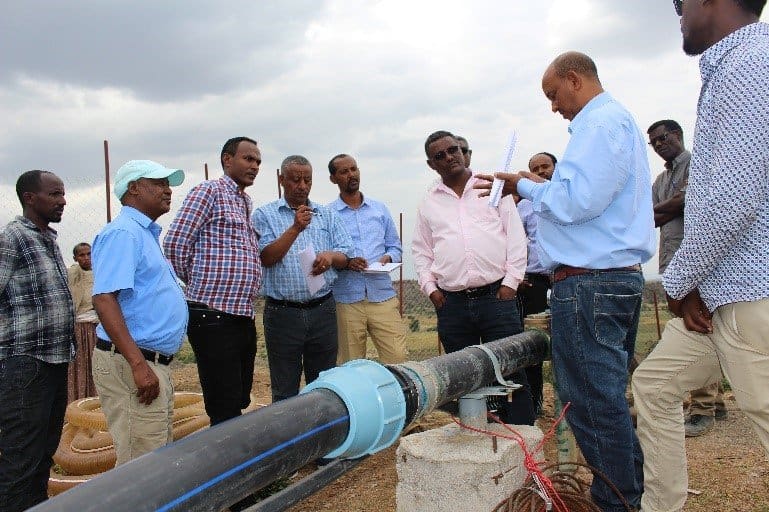
Abebaw discussing with project steering committee members – representatives of different government organizations and the donor – about the progress of an ongoing solar powered irrigation scheme (Manyahlshal Ayele/CARE Ethiopia)
Background: The CARE Water+ team has been working to strengthen WASH systems in the Amhara and Afar regions in Ethiopia for more than 20 years, delivering sustainable services to rural communities through empowerment, multi-level planning, and data driven decision making, among other things. For their efforts, the Water+ team was recently awarded CARE’s 2020 WASH Systems Change Award. The following is an interview with the lead coordinator for CARE’S Water+ projects in Ethiopia.
Alec Shannon (AS), Content Strategist, Agenda for Change: What parts of the system is the Water+ team strengthening in Ethiopia?
Abebaw Kebede (AK), Water+ Program Coordinator, CARE Ethiopia: Around 15 years ago, the community involvement in water management was very limited in Ethiopia. Because of that, ownership was not there, and the communities were not organized to manage the water supply schemes after handover. We decided to involve the communities from the very beginning. We put them in the front seat – they are the ones who are going to select the types of interventions or schemes, who decide the amount of contributions they can make, and they manage their own construction materials and so on.
AS: How are you working with the government?
AK: Now there are zonal, district, and regional level steering committees as part of the project implementation, comprised of people from different government sector offices (there are around 8 – 11 government sector offices), and their role is to monitor water project implementation, community participation, and review processes. They also provide support in terms of solving any challenges or problems with the projects.
AS: Tell me more about your process?
AK: The first thing we did was to establish a baseline of how water services were functioning. This was 11 years ago in Amhara region. We did detailed inventories of water services to find out the type of scheme, the number of beneficiaries, how the WASH committee is functioning, do they have financing, etc. The data showed that more than 50% of the water schemes were not functional at that time. We presented the findings to government officials at the zonal, district, and regional level. In response, the government adjusted the water supply coverage numbers, and they decided to focus more on operation and management of existing infrastructure rather than new infrastructure development, among other actions.
AS: What about other NGOS, when did you realize that you all should be talking with one another and working together?
AK: We are involved in the WASH cluster at the regional level and at the federal level. We also work with five international NGOs, including World Vision, Catholic Relief Services[1], WaterAid[2], and others under the Millennium Water Alliance. We are working together in different areas, taking a lead in different disciplines. We have frequent joint meetings, learning events, and we work to collectively advocate for improving the WASH governance in the places where we work. We are also encouraging governments to focus not only on constructing new schemes, but rather on the management and operation of existing ones.
AS: What would help you the most to strengthen the system at this point? What goals do you still need to reach?
AK: Currently, the WASH committees do not have legal status, so we are working to shift this informal committee to have legal status. Increasing their capacity is another issue. Now we are working with regional government to establish a union of WASH boards to manage the water schemes, establish ownership, and to negotiate with the technicians, caretakers, or artisans to maintain the water schemes and so on. And the plan is to have more cooperative status of the WASH boards so there will be increased capacity to monitor in terms of finances and capacities.
AS: What would you tell an organization that is about to start this shift to system strengthening?
AK: My advice is to start from the bottom – it is good to start from a lower level, like with a local community, so that you can collectively create a model to develop different scenarios for the government to take forward.
[1] Catholic Relief Services is an Agenda for Change member.
[2] WaterAid is also a member.
—
Abebaw Kebede is Program Coordinator for CARE Ethiopia’s Water+ Program. He joined CARE in 2005 after 17 years of serving in small- and large-scale agricultural development activities. He has over 30 years’ experience of development work, focusing on program management, leadership, grant management, capacity development, women’s empowerment, community development, and partnership building. He holds a master’s degree in Economics (Indira Gandhi University), and bachelor’s degrees in Agricultural Engineering (Alemaya University) and Economics (Unity University).
